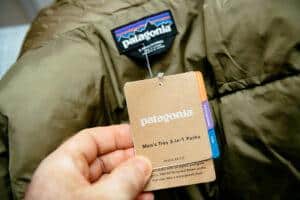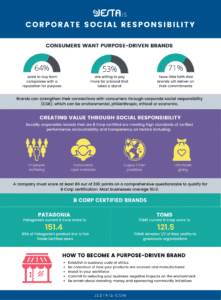by Camille Chin | March 8, 2022
Consumers want the businesses they shop at to be socially responsible and they’re prepared to reward (and penalize) retail brands for their efforts — or lack thereof.
In a 2021 survey of 395,000 people worldwide conducted by the Havas group:
• 73% of consumers said that brands must act now for the good of society and the planet
• 64% said that they prefer to buy from companies with a reputation for purpose
• 53% said that they are willing to pay more for a brand that takes a stand
The insights were similar in PwC’s 2021 Consumer Intelligence Series survey. In it, 83 percent of respondents agreed that companies should be actively shaping environmental, social and governance (ESG) best practices.
Make Sure Your Heart Is In It
Retail brands that practice corporate social responsibility (CSR), also called corporate citizenship, enact positive change. Those changes can be environmental, philanthropic, ethical or economic. What’s most important is that the efforts must be genuine.
Consumers want to engage with purpose-driven brands, but they are aware of superficial attempts called “CSR washing.” According to the 2021 Meaningful Brands study, brand trust is at an all-time low.
• only 47% of brands are seen as trustworthy
• 71% of respondents have little faith that brands will deliver on their commitments
The consensus is that CSR is profitable. But experts also agree that if consumers detect that a brand has latched onto a cause for insincere and self-serving reasons, it will backfire.
Retail Brands That Lead With Conscience
There are many retail brands that have successfully transformed personal passions into corporate purpose. Patagonia and TOMS are just two.
Patagonia

Patagonia believes that “you can’t make good products in a bad factory.” The outdoor apparel retail company has built a powerful and rigorous social responsibility program that analyzes and manages the impact its business has on workers and communities in their supply chain.
A cornerstone of their Social and Environmental Responsibility (SER) program is their Supplier Workplace Code of Conduct. It outlines their policies on child labor, wages and benefits, hours of work, health and safety, environment, animal welfare, traceability, quality and more. The Code of Conduct applies to every level of their supply chain from farm to garment factory.
Patagonia offers more Fair Trade Certified sewn styles than any other apparel brand. They pay a premium for every item that carries the certification and the extra money goes directly to the workers. An amazing 85 percent of Patagonia’s product line is Fair Trade Certified sewn.
Patagonia monitors their largest raw-material suppliers, its SER team visits production facilities regularly and the company audits 100 percent of their finished-goods factories. Patagonia is a founding member of the Fair Labor Association which arbitrarily audits samplings of supply chains to identify opportunities for improvement. The results are available to the public.
Patagonia is a B Corp and their current score is 151.4. To qualify for the certification, a company must score at least 80 out of 200 points on a comprehensive questionnaire about its social and environmental performance, accountability and transparency. Most businesses average 50.9.
TOMS

Footwear and lifestyle brand TOMS is also a B Corp. Their current score is 121.5. TOMS donates 1/3 of their profits to grassroots organizations, an evolution of their popular One for One model (you buy a pair of shoes, they give a pair to a person in need).
TOMS works to build equity in marginalized communities by investing in boosting mental health, increasing access to opportunity and ending gun violence. In 2021, they donated over US$2 million in cash grants, which supported 43 community-based organizations worldwide.
TOMS’ earthwise products consist of mostly eco-friendly materials that use eco-friendly processes: REPREVE recycled polyester made with post-consumer plastic bottles, for example, and TENCEL Lyocell Fiber made from wood pulp harvested from sustainably managed forests.
TOMS goals include sourcing 100% sustainable cotton by 2025, making sure their packaging is made with at least 80% recycled materials, and measuring their carbon footprint and establishing reduction targets by 2025.
Like Patagonia, TOMS is also member of the Fair Labor Association. They work hard to identify long-term suppliers that share their values and conduct their businesses ethically.
Consumers Connect with Purpose Not Products
Havas’ 2021 Meaningful Brands study revealed that if 75 percent of brands disappeared overnight, most people wouldn’t care or would easily find a replacement. This suggests that a customer’s loyalty to a brand is not because of its products and services, but rather for what the brand stands for. Social responsibility may be more important than we think.
Patagonia and TOMS have successfully infused humanity into their businesses, and brands in other retail verticals have too. Ben and Jerry’s has done it successfully through Fairtrade Certified ingredients, environmentally friendly farming practices, socially responsible business practices, activism and charitable donations. Their current overall B Corp rating is 110.
Klean Kanteen is another B Corp-certified company with a current overall score of 101.8. Klean Kanteen pioneered stainless steel, BPA-free, multi-use water bottles and food canisters. Klean Kanteen is a Climate Neutral Certified Brand and a member of 1% for the Planet. They invest 1% of each sale into organizations focused on plastic pollution, safe consumer products, land and water conservation, and outdoor stewardship. They’ve donated US$3.4 million so far.
How Brands Can Get Started
Remember: integrity must be at the heart of your business’s CSR initiatives. Draw from your personal passions to drive your corporate purpose and make positive impacts on society.
Here are some steps to consider to help you get started.
- Establish a business code of ethics
- Be conscious of how your products are sourced or manufactured
- Invest in your workforce
- Commit to reducing your business’ negative impacts on the environment
- Be smart about donating money and sponsoring community initiatives
Check out the CSR infographic here.

